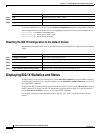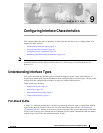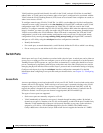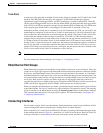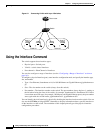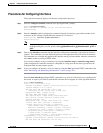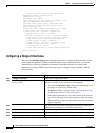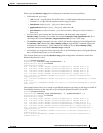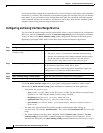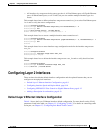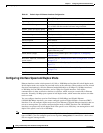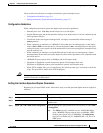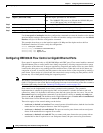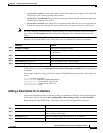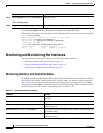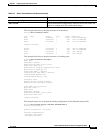
9-8
Catalyst 2950 Desktop Switch Software Configuration Guide
78-11380-05
Chapter 9 Configuring Interface Characteristics
Using the Interface Command
If you enter multiple configuration commands while you are in interface range mode, each command is
executed as it is entered. The commands are not batched together and executed after you exit interface
range mode. If you exit interface range configuration mode while the commands are being executed,
some commands might not be executed on all interfaces in the range. Wait until the command prompt
reappears before exiting interface range configuration mode.
Configuring and Using Interface Range Macros
You can create an interface range macro to automatically select a range of interfaces for configuration.
Before you can use the macro keyword in the interface range macro global configuration command
string, you must use the define interface-range global configuration command to define the macro.
Beginning in privileged EXEC mode, follow these steps to define an interface range macro:
Use the no define interface-range macro_name global configuration command to delete a macro.
When using the define interface-range global configuration command, note these guidelines:
• Valid entries for interface-range:
–
vlan vlan-ID - vlan-ID, where VLAN ID is from 1 to 4094 with the enhanced software image
installed or 1 to 1005 with the standard software image installed
–
fastethernet slot/{first port} - {last port}, where slot is 0
–
gigabitethernet slot/{first port} - {last port}, where slot is 0
–
port-channel port-channel-number - port-channel-number, where port-channel-number is
from 1 to 64.
• You must add a space between the interface numbers and the hyphen when entering an
interface-range. For example, fastethernet 0/1 - 5 is a valid range; fastethernet 0/1-5 is not a valid
range.
• The VLAN interfaces must have been configured with the interface vlan command. The show
running-config privileged EXEC command displays the configured VLAN interfaces. VLAN
interfaces not displayed by the show running-config command cannot be used as interface-ranges.
Command Purpose
Step 1
configure terminal Enter global configuration mode.
Step 2
define interface-range macro_name
interface-range
Define the interface-range macro, and save it in NVRAM.
• The macro_name is a 32-character maximum character string.
• A macro can contain up to five comma-separated interface ranges.
You do not need to enter spaces before or after the comma.
• Each interface-range must consist of the same port type.
Step 3
interface range macro macro_name Select the interface range to be configured by using the values saved
in the interface-range macro called macro_name.
You can now use the normal configuration commands to apply the
configuration to all interfaces in the defined macro.
Step 4
end Return to privileged EXEC mode.
Step 5
show running-config | include define Show the defined interface range macro configuration.
Step 6
copy running-config startup-config (Optional) Save your entries in the configuration file.



